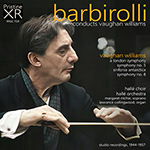
This album is included in the following sets:
This set contains the following albums:
- Producer's Note
- Full Track Listing
- Cover Art
Few conductors championed Ralph Vaughan Williams with the heartfelt conviction of Sir John Barbirolli. His advocacy wasn’t a matter of patriotic obligation but something far more instinctive and personal. Barbirolli recognised in Vaughan Williams a voice that spoke directly to him: rugged yet lyrical, visionary yet rooted in the soil. And the Hallé Orchestra, which he shaped across decades into a warm, communicative and unmistakably characterful ensemble, became the perfect medium for this shared musical instinct.
The Hallé under Barbirolli had a sound unique in British orchestral life. The strings carried a slightly husky vibrancy, never sugary, always expressive. The woodwinds were full of personality rather than cosmetic tidiness, while the brass projected great confidence without descending into coarseness. This was a sound built patiently, rehearsal by rehearsal, season after season. Vaughan Williams felt this deeply. He once remarked that Barbirolli seemed to understand his music from the inside, and these recordings reveal exactly what he meant. Across different years, venues and recording formats, the same thread of empathy, authenticity and long familiarity runs through them.
The earliest performance preserved here, the 1944 recording of the Fifth Symphony, stands as one of those wartime musical documents that feel almost miraculous in their serenity. Composed at a time when every corner of Europe was overshadowed by conflict, the Fifth is Vaughan Williams’s hymn to renewal, reconciliation and inner light. Barbirolli approaches it with humility rather than grandeur. The long melodic spans are gently breathed, the transitions unhurried, and the Hallé play with astonishing tenderness. Even through the limitations of mono, there is a luminous clarity to the interpretation. This is a performance that glows from within, avoiding any sense of rhetorical overstatement.
By contrast, the 1953 Sinfonia Antarctica inhabits a vastly more dramatic and dangerous landscape. Vaughan Williams transformed his earlier film score into a symphony that is part tone poem, part spiritual meditation and part frozen hallucination. Barbirolli clearly relishes both its vastness and its strangeness. Margaret Ritchie’s haunting soprano, the spectral writing for the Hallé Choir and Lawrance Collingwood’s organ contributions create a sound world that feels elemental and ghostly. Barbirolli resists the temptation to warm the music artificially. Instead, he lets its icy grandeur speak with its own voice, shaping the great shifting masses of sound with discipline, patience and a powerful sense of atmosphere.
The arrival of stereo brings immediate rewards in the 1957 London Symphony. Here Vaughan Williams gives us a portrait of a city he both knew and loved, though never sentimentally. Barbirolli captures its sprawling architecture with remarkable assurance, balancing its fog-bound harmonies, its street-corner bustle and its sudden moments of visionary stillness. In stereo the Hallé expand in depth and colour, and the subtle inner workings of the orchestration emerge more naturally. What Barbirolli offers is a London rich with memory and presence, full of shifting perspectives yet held together by an unmistakable structural steadiness.
Recorded a little earlier, the Eighth Symphony is Vaughan Williams at his most playful, exploratory and mischievous. It’s a kaleidoscope of timbres and textures: tuned percussion chatter, bright brass, lithe strings and rhythmic gambits that seem almost cheeky. Barbirolli throws himself into its colouristic experiments with evident delight. Yet he never loses the underlying dignity that runs through even the composer’s most whimsical pages. The stereo sound reinforces the symphony’s character, giving each section of the orchestra room to shine without ever fracturing the unity of the whole.
Taken together, these four performances form a portrait of a conductor who brought out the best in a composer he deeply admired. Barbirolli understood Vaughan Williams’s paradoxes: the mixture of pastoral warmth and granite strength, the folk-inflected humanity alongside visionary breadth. And the Hallé, shaped so thoroughly by his long stewardship, respond with loyalty, subtlety and unmistakable personality.
Whether in wartime mono or post-war stereo, whether bathing in spiritual calm or navigating the desolation of the Antarctic, what you hear is a partnership built on trust and instinctive understanding. These recordings aren’t merely historical artefacts; they are the living sound of musicians meeting a composer at the deepest level, offering his symphonies with warmth, clarity and a sincerity that remains profoundly moving today.
BARBIROLLI conducts Vaughan Williams
disc one (75:11)
VAUGHAN WILLIAMS Symphony No. 5
1. 1st mvt. - Preludio (11:29)
2. 2nd mvt. - Scherzo. Presto misterioso (4:26)
3. 3rd mvt. - Romanza. Lento (11:31)
4. 4th mvt. - Passacaglia. Moderato (9:24)
VAUGHAN WILLIAMS Sinfonia Antarctica (Symphony No. 7)
5. 1st mvt. - Prelude. Andante maestoso (10:06)
6. 2nd mvt. - Scherzo. Moderato (5:20)
7. 3rd mvt. - Landscape. Lento (8:59)
8. 4th mvt. - Intermezzo. Andante sostenuto (5:39)
9. 5th mvt. - Epilogue. Alla marcia, moderato (non troppo allegro) (8:17)
Margaret Ritchie, soprano
Lawrance Collingwood, organ
Hallé Choir
disc two (73:22)
VAUGHAN WILLIAMS A London Symphony (Symphony No. 2)
1. 1st mvt. - Lento - Allegro resoluto (13:59)
2. 2nd mvt. - Lento (11:36)
3. 3rd mvt. - Scherzo (Nocturne) (7:30)
4. 4th mvt. - Finale. Andante con moto - Maestoso alla marcia - Lento - Epilogue (13:27)
VAUGHAN WILLIAMS Symphony No. 8
5. 1st mvt. - Fantasia (Variazioni senza Tema) (10:11)
6. 2nd mvt. - Scherzo alla marcia (per stromenti a fiato) (3:43)
7. 3rd mvt. - Cavatina (per stromenti ad arco) (7:50)
8. 4th mvt. - Toccata. Moderato maestoso (5:06)
Hallé Orchestra
conducted by Sir John Barbirolli
XR remastering by Andrew Rose
Cover artwork based on a photograph of Sir John Barbirolli
Symphony No. 5
recorded 17 February, 1944, Houldsworth Hall, Manchester
presented in Ambient Stereo
Sinfonia Antarctica
recorded 15-16 June, 1953, Free Trade Hall, Manchester
presented in Ambient Stereo
A London Symphony
recorded 28-29 July, 1957 (stereo), Free Trade Hall, Manchester
Symphony No. 8
recorded 19 June 1956 (stereo), Free Trade Hall, Manchester
Total duration: 2hr 38:33

